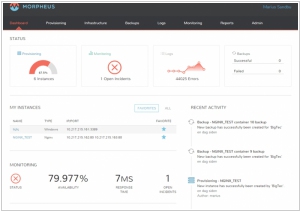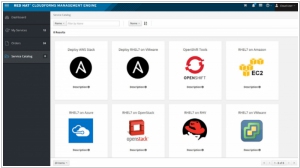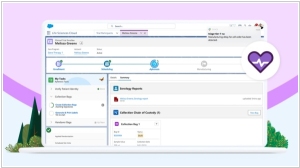CloudForms vs Morpheus
May 28, 2023 | Author: Michael Stromann
8

Morpheus is a leading cloud application management and orchestration platform designed from the ground up for truly agnostic cloud management. Morpheus gives developers, IT managers, and DevOps professionals full control over both VM and container-based systems across any cloud or infrastructure. 100% agnostic multi cloud management for Hybrid IT. Enable self-service provisioning and DevOps automation for VMware, Kubernetes, OpenStack, AWS, Azure, and more.
CloudForms and Morpheus are both cloud management platforms that offer a wide range of features, but they differ in their approach, capabilities, and target audiences.
CloudForms, developed by Red Hat, is an open-source hybrid cloud management platform. It focuses on providing management and automation capabilities for hybrid cloud environments, allowing users to manage resources across multiple cloud providers and on-premises infrastructure. CloudForms offers features such as self-service provisioning, policy-based governance, monitoring, and orchestration. It integrates well with Red Hat's ecosystem and is suited for organizations using Red Hat technologies and seeking a flexible and customizable cloud management solution.
Morpheus, on the other hand, is a multi-cloud management platform that emphasizes simplicity and ease of use. It offers a unified interface to manage and provision resources across various cloud providers, including public, private, and hybrid clouds. Morpheus provides features such as self-service provisioning, automation, monitoring, cost optimization, and application lifecycle management. It also includes built-in integrations with popular cloud providers, tools, and configuration management systems. Morpheus is designed to streamline and simplify cloud management for organizations of all sizes, making it suitable for both technical and non-technical users.
See also: Top 10 Cloud Management platforms
CloudForms, developed by Red Hat, is an open-source hybrid cloud management platform. It focuses on providing management and automation capabilities for hybrid cloud environments, allowing users to manage resources across multiple cloud providers and on-premises infrastructure. CloudForms offers features such as self-service provisioning, policy-based governance, monitoring, and orchestration. It integrates well with Red Hat's ecosystem and is suited for organizations using Red Hat technologies and seeking a flexible and customizable cloud management solution.
Morpheus, on the other hand, is a multi-cloud management platform that emphasizes simplicity and ease of use. It offers a unified interface to manage and provision resources across various cloud providers, including public, private, and hybrid clouds. Morpheus provides features such as self-service provisioning, automation, monitoring, cost optimization, and application lifecycle management. It also includes built-in integrations with popular cloud providers, tools, and configuration management systems. Morpheus is designed to streamline and simplify cloud management for organizations of all sizes, making it suitable for both technical and non-technical users.
See also: Top 10 Cloud Management platforms



